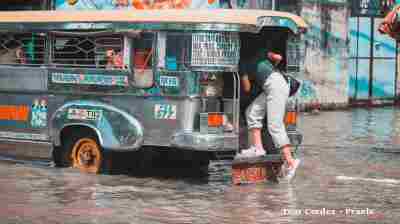Uzbek President Shavkat Mirziyoyev was roundly criticised in October after he won re-election with a landslide, standing unopposed apart from a few straw men put up to make the elections seem legitimate.
As bne IntelliNews reported from Tashkent, there were a total of five candidates, including the incumbent, but the other four were from pro-government parties. The real opposition candidates from the traditional opposition parties were barred from the election, reportedly under pressure from the authorities.
However, this was no Lukashenko-like election and the landslide victory was genuine; voters vox-popped by bne IntelliNews in Tashkent on the day overwhelming supported Mirziyoyev and wanted him to stay on in office.
And election observers from the OSCE interviewed by bne IntelliNews on the day reported that the voting was free and fair, as far as the actual voting was concerned; there was no Russian-style mass stuffing of ballot boxes, as no falsification was needed. Moreover, observers interviewed by bne IntelliNews said that the government was co-operating closely with the OSCE, as “they seem keen to understand how to run a free election.”
Is Uzbekistan reverting to the Central Asia norm of centralised dictatorship where the president remains in office for life and elections are a sham, designed only to bolster the beloved leader’s legitimacy. After all, that is the system the country had under its previous, and only, president since independence, Islam Karimov.
The truth is more complicated. The government is genuinely interested in giving its citizens a voice and it is working hard to deal with their problems. But what it has done is to ignore Western style parliamentary politics where the policies are debated on the house floor and instead adopted a political system that has been in use in Central Asia since the bronze age – the Mahalla.
The Mahalla
 “The problem is not the lack of qualified people. We have managers enough. The main issue is to work more closely and more efficiently with the Mahalla. They connect social groups of 500-1,000 people. They tell us their problems and what they expect. Our work is to solve these problems from the bottom up,” Tursunor Kabul, the Khakim, or mayor, of the city of Navoi told bne IntelliNews in an interview.
“The problem is not the lack of qualified people. We have managers enough. The main issue is to work more closely and more efficiently with the Mahalla. They connect social groups of 500-1,000 people. They tell us their problems and what they expect. Our work is to solve these problems from the bottom up,” Tursunor Kabul, the Khakim, or mayor, of the city of Navoi told bne IntelliNews in an interview.
The Mahalla is a local organisation based on a community. This can be a few blocks on a street, a section of a city, a suburb or even just a village. The territory is ill defined but the Mahalla is a community living together with shared interests and needs and they form an elected representation that can then talk to the local authorities to meet these needs.
The issues the Mahalla deals with are manifold. If a couple wants to divorce the Mahalla will come and try to iron out the conflicts. If the breadwinner in a family dies or is incapacitated the Mahalla will club together to support them. And more significantly for the Mirziyoyev government, if the roads in the street are broken, they lack a kindergarten or need gas to heat their homes in the winter, then the Mahalla will go to the administration and request them.
Kabul says that it is his local administration's main work: to listen to the Mahallas in Navoi and meet all their needs. He says his goal is to cut down on the number of bureaucrats between the local government and the Mahalla in order to deal with the issues they bring up as quickly and efficiently as possible.
This is a form of direct action democracy. Tashkent’s lack of interest in Western style parliamentary politics is the lack of things to debate and the distance there is between a political party and the man in the street. Uzbekistan is at an early stage of transition, so there is little to debate on what needs to be done. The reforms needed are large, basic and obvious. Moreover, party politics directly connects the parties to the people only once every four years during elections. It is possible to lobby your MP in the meantime, but the Uzbek version of this has put the lobbying of MPs at the centre and moreover, it has created a much more formal system of community representation than the West has, which just relies largely on individuals to start awareness campaigns on specific issues. In the Uzbek system the contact between the Mahalla and the administration is routine and constant. Problems are fixed more or less immediately.
Building Mahallas into the system
The Communist Party tolerated the Mahalla, but Mirziyoyev has gone out his way to make use of and extend the system as well as formally integrating it into the constitution as a basic political unit.
Elections for the “Khakim”, or “elder”, and the local representatives follow a traditional, not formal, schedule and each Mahalla has its own timing and rules. But those elected receive a salary from the state and hold no other job. Moreover, under Mirziyoyev the budget dedicated for these salaries has been increased, so whereas a Mahalla used to employ two or three full time persons, many Mahallas have a full time staff of up to 10 people, says Kabul.
The Mirziyoyev government has expanded the legal state of the Mahalla in order to better integrate it and formally include it as part of Uzbekistan’s political system. In the most significant changes the Mahalla’s powers as a self-governing body were defined and guaranteed by changes to Article 105 of the Constitution.
On top of that, there have been 49 new laws on the status, role and responsibilities of the Mahalla enacted over the last four years as well as 40 changes to regional laws and five presidential decrees, one of which singled out improving the rights of women and children, as families and their needs remains at the very core of the Mahalla’s raison d'être. Indeed, the formal name for the ministry that deals with social issues is the Ministry for Mahalla and Family Support of the Republic of Uzbekistan, which has divisions in all the regions of the country.
With expansion of the Mahalla’s official staff new positions have been created that deal specifically with law enforcement, family, women's and socio-spiritual issues, urban beautification, farmland and entrepreneurship.
The Mahalla is not a political system that is recognisable to westerners that have been brought up on a diet of parliamentary debate and individual freedoms. The Mahalla may well serve the Uzbek community better than the western system, but one key element missing from the Mahalla system is the checks and balances the western political system puts on those in power, something that has been sorely lacking in most countries in Central Asia.
The Mahalla puts more weight on the community and shared responsibility. But for the Mirziyoyev government it is a structure that connects the government as directly to the communities in the country as it can and is being used by the government to push through change in a relationship that is a two-way street.
The Mahalla system is especially effective in the more remote settlements in Uzbekistan, which are much more dependent on the government’s help as conditions in the desert towns are harsh. In 2020 the government gave grants and loans to more than 200,000 people via the Mahallas to support small-scale agriculture and craft workshops, amongst other things, the ministry says. The Mahallas also helped resolve conflicts in 21,000 potential divorces, intervened in 16,000 cases of domestic violence and organised assistance to 164,000 low-income families.
The Social Affairs ministry described the relation on its website like this: “The main criterion was the effective implementation of a new system for solving social problems of the population on the basis of the principle “The chairman of the Mahalla is a reformer”.”
Navoi is flourishing and for Mayor Kabul the Mahalla is the key institution to make sure the prosperity is felt at street level.
“We have opened our gates to investors and the number of foreign investors and experts coming here has increased. The exports by local companies have increased four-fold from just Navoi and the amount of in-bond investment in 2021 will reach $170mn plus credits,” Kabul said. “That creates new jobs for the youth. The increase in the local budget also allows us to solve the local problems, as before there was too little money to spend on things like infrastructure. Now the per capita income in Navoi is in the top two next to Tashkent and also in the regional economic production.”
Features

Flood corruption scandal shakes the Philippines
The Philippines is grappling with a widespread controversy surrounding its flood control programme, with allegations of billions of pesos being siphoned off from projects meant to protect vulnerable communities.

The European Commission proposes to “creatively” tap Russia’s $300bn of frozen assets with Reparation Loans
The European Commission is floating a new idea of how to “creatively” tap Russia’s $300bn of frozen assets without the need to appropriate, which is legally questionable, by replacing the money transferred to Kyiv with EU-backed bonds.

“Yuri Gagarin” cosmodrome seeking a future in space – and tourism
Golden age of spaceport is long over, with Moscow focused on facilities in Russia. Kazakhstan, however, hopes it can find profitable niche in launching satellites.

Russia’s 13 “drowning men” sink into corporate debt – The Bell
The Central Bank of Russia has quietly acknowledged growing financial distress among the country’s largest companies, identifying 13 corporations as "truly problematic" borrowers at the end of the first quarter.




